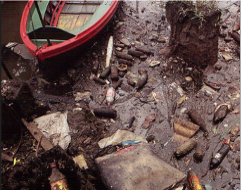365 Ways To Save The Earth - Third Volume

In this third post of ‘365 Ways to Save the Earth’ environment protection initiative our intention is, once again, to raise public awareness of environmental problems and non-renewable resources issues.(You can read the previous article here Dumpster Rentals Blog ). This time we would like to share with the worldwide community a few easy-to-do recommendations on how we can contribute to saving not-renewable resources and reducing the level of pollutions.
Ventilate your home regularly
Indoor air pollution affects all enclosed spaces. This can be caused by a ventilation system that does not remove stale air properly, by a faulty gas stove or heater, or by the improper use of products that require a high degree of air circulation to dissipate pollutants, such as paints, varnishes, and household cleaners. Some pollutants, such as mites and molds, are of natural origin.
On average, we spend 80% of our lives in buildings. The quality of the air indoors can therefore have a major effect on our health. To circulate the air and remove pollutants, ventilate your indoor space regularly and generously, even in winter.
Take a different approach when buying clothes.
Dressing ourselves is such a commonplace act that we rarely question the social and environmental impact of the clothing we buy. Who made it and what is it made of? How far did it travel before being sold? Polyester, nylon, and fake fur are not biodegradable, and their manufacture from non-renewable petrochemical products requires large amounts of water and energy. Growing cotton uses large quantities of pesticides. Wool, linen, and hemp, on the other hand, are more environmentally friendly, as is organic, locally made cotton.
Choose clothing and shoes that are made from organic crops, and manufactured in the United States or Canada, or fairly traded. Consider buying second-hand clothes from thrift stores and consignment shops.
Say “NO” to disposable diapers
It takes 4.5 trees to produce the pulp needed for the 4.600 disposable diapers an average baby needs. A glassful of crude oil is needed to make the plastic found in a single disposable diaper. The diaper is worn only a few hours, but will take about 400 years to decompose in the waste dump. There has always been an alternative: washable diapers. Absorbent, effective, and comfortable, reusable modern diapers are very different from the old, folding variety. A single washable layer can be used for several years. When it is finally thrown out, it decomposes in six months, without producing any pollution.
Choose the economical, and ecological, diaper: cover your baby’s bottom in a cloth diaper.
Invest in socially responsible companies
One in five adults worldwide can neither read nor write. Of these, 98% are in developing countries, and two-thirds are women. In 2001 in Sub-Saharan Africa, almost 1 in every 10 people aged between 15 and 24 was infected with HIV, and 2.4 million people died of AIDS. In 1966, Indira Gandhi pointed out that the greatest source of pollution on earth was poverty. And yet 4% of the wealth accumulated by 225 richest people in the world could educate, feed, and provide medical treatment for the entire population of the planet.
Reward companies that acknowledge that societal inequalities can be alleviated by their actions-invest in socially responsible companies.
Do not throw your waste into the gutter.
Globally, most domestic and industrial wastewater is returned to the environment untreated. In China, 80% of industrial wastewater, often loaded with toxic substances, is emptied directly into the environment and destroys fauna and flora. The impact of such actions is made all the more serious by the fact that industries in developing countries often produce much more pollution than their counterparts in wealthier countries.
In cities, runoff water, which trickles along gutters and then into storm drains, is not treated either: it flows directly into rivers. Do not throw litter or waste into the gutter: it will go the same way as the water.
Use the sleeper timer
Scientists say that in the coming years the habitats, natural resources, and species that make up life on earth will be able to adapt only to an average temperature increase of 1 F, and 4-inch rise in sea levels. To remain within these limits, worldwide greenhouse gas emissions would have to be cut by 60% at once. This is impossible. The faster warming takes place, the more difficult it will be to control its consequences. Hence the need to act at once.
Televisions and stereos often have sleep timers, which allow the appliance to shut off after a given amount of time. If you normally fall asleep watching television of listening to music, use the timer to avoid wasting the energy of the appliance running all night.
At Dumpster Rentals Cooperative we would like to thank our supporters:
•
Dumpster Rentals in Seattle
, WA
•
Dumpster Rentals in Calgary, AB
•
Dumpster Rentals in Sacramento
, CA
•
Dumpster Rentals in Denver
, CO
•
Roll Off Dumpster Rentals in Bellevue
, WA
•
Dumpster Rentals in Brooklyn
, NY
•
Dumpster Rentals in Dallas
, TX
•
Dumpster Rentals in Kirkland
, WA
•
Dumpster Rentals in Edmonton
, AB
and many other Dumpster Rentals & Roll Off Container Service companies for their great help in promoting this environment protection movement.
- Published: 2011-11-22T10:49:12-08:00
- Author: Anna Krupp, Dumpsters & Roll Off Container Consultant




